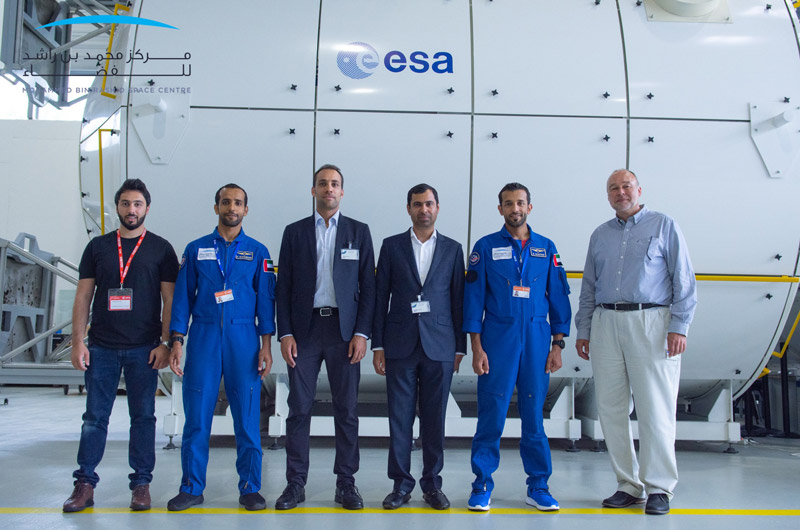- City Fajr Shuruq Duhr Asr Magrib Isha
- Dubai 04:32 05:49 12:21 15:48 18:47 20:04

The Mohammed bin Rashid Space Centre, MBRSC, announced that Emirati astronauts Hazzaa AlMansoori and Sultan AlNeyadi have completed their training at the European Astronaut Centre, EAC, of the European Space Agency, ESA, in Cologne, Germany.
The training focused on the European unit, Columbus, onboard the International Space Station, ISS. Part of the training was attended by Yousuf Hamad AlShaibani, Director-General of MBRSC, and Salem AlMarri, Assistant Director-General for Scientific and Technical Affairs at MBRSC and Head of the UAE Astronaut Programme. The training is part of the preparations for the first Emirati astronaut to travel to the ISS on 25th September aboard the Soyuz MS 15, and part of the overall training plan for the two Emirati astronauts.
The astronauts completed around 30 hours of theoretical and practical training, supervised by a group of ESA specialists, focusing on the equipment and systems in the European unit of the ISS, such as the Life Support System that ensures the survival of astronauts in ISS. The training, all performed in a real like module of the European laboratory aboard ISS, Columbus, also included communicating with the ground station. The Columbus Laboratory is ESA’s largest single contribution to the ISS, shared by NASA and ESA to carry out the largest number of scientific researches in a virtually non-gravitational environment.

Under the supervision of researchers and trainers from ESA, the two astronauts were trained on the scientific experiments the UAE astronaut will be working on during his time onboard. The training programme included four main types of scientific experiments - time perception in microgravity, TIME, Brain DTI, Fluidics, fluid dynamics in space, and DNA-m age, which tests the changes that happen to human’s DNA due to traveling to space; it will be the first time that this experiment will be carried out on a human from the Arab region.
AlShaibani was briefed on the training during an introductory tour to the various training departments at EAC, where he was shown the latest technologies and advanced and highly efficient scientific equipment used to train the two astronauts.
"EAC has advanced services, including the latest technologies and advanced scientific devices. This is a significant contribution to developing the skills and capabilities of AlMansoori and AlNeyadi," said AlShaibani.
AlShaibani stressed that what he saw at EAC reflects the commitment of the UAE’s leadership to offer all the possibilities and modern technologies, to enhance the capabilities of the two astronauts to qualify to travel to the ISS, and return home safely to continue building the space sector in the UAE.
Salem AlMarri highlighted that these exercises prepare the UAE astronaut to work professionally in ISS different departments even in emergency situation, in addition to carrying out the scientific tasks that will be entrusted to him.
He noted that the first phase of both experiments the DNA-m age and TIME has already started at EAC where data and samples were collected from the UAE astronauts. These experiments aim to measure the impact of traveling to space and microgravity environment on human body.
The European Astronaut Centre, EAC, is responsible for selecting and training ESA astronauts. It consists of four sections, each section is specialised in a specific task such as training, medicine and education, and communicating with astronauts onboard the International Space Station via the ground control network.
![]() Follow Emirates 24|7 on Google News.
Follow Emirates 24|7 on Google News.